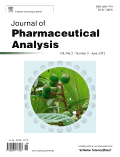
Journal of Pharmaceutical Analysis
Scope & Guideline
Connecting researchers to shape the future of drug analysis.
Introduction
Aims and Scopes
- Pharmaceutical Chemistry and Drug Development:
Research in this area focuses on the chemical properties and synthesis of pharmaceutical compounds, exploring novel drug formulations and their therapeutic efficacy. - Analytical Method Development:
The journal emphasizes the development and validation of analytical methods using various techniques such as mass spectrometry, chromatography, and spectroscopy for the quantification and characterization of drugs and their metabolites. - Natural Products and Traditional Medicine:
There is a significant focus on the analysis of natural compounds, including those derived from traditional Chinese medicine, and their pharmacological effects, contributing to the understanding of herbal medicine in modern therapeutics. - Pharmacokinetics and Drug Metabolism:
Studies that investigate the absorption, distribution, metabolism, and excretion (ADME) of drugs, providing insights into their pharmacokinetic profiles and potential therapeutic implications. - Toxicology and Drug Safety:
Research dedicated to understanding the safety profiles of drugs and their metabolites, including studies on toxicological implications and risk assessments. - Nanomedicine and Drug Delivery Systems:
Innovative approaches to drug delivery using nanotechnology, focusing on enhancing the efficacy and bioavailability of therapeutic agents through novel delivery systems. - Omics Technologies:
The integration of multi-omics approaches such as genomics, proteomics, and metabolomics to elucidate complex biological interactions and inform drug development processes. - Machine Learning and Data Analysis:
The application of machine learning techniques in analyzing complex pharmaceutical data, enhancing predictive modeling and decision-making in drug development.
Trending and Emerging
- Sustainable and Green Analytical Chemistry:
Research is increasingly focused on developing eco-friendly analytical methods, such as green chemistry practices in pharmaceutical analysis, reflecting a broader societal shift towards sustainability. - Advanced Mass Spectrometry Techniques:
There is a notable trend towards the utilization of advanced mass spectrometry techniques, including high-resolution and imaging mass spectrometry, to enhance the sensitivity and specificity of drug analysis. - Integration of Artificial Intelligence and Machine Learning:
The application of AI and machine learning in drug discovery and analysis is rapidly gaining traction, enabling more efficient data processing and predictive modeling for pharmaceutical research. - Personalized Medicine and Pharmacogenomics:
Emerging research is increasingly focused on personalized medicine approaches, utilizing pharmacogenomics to tailor drug therapies based on individual genetic profiles. - Targeted Drug Delivery Systems:
There is a growing emphasis on the development of targeted drug delivery systems, including nanoparticles and other novel carriers, to enhance therapeutic outcomes and reduce side effects. - Microbiome and Drug Interaction Studies:
Investigations into the interactions between the gut microbiome and pharmaceutical compounds are on the rise, highlighting the importance of microbiome research in understanding drug metabolism and efficacy. - High-Throughput Screening Techniques:
The trend towards high-throughput screening methodologies for drug discovery and analysis is expanding, allowing for rapid evaluation of large compound libraries. - Immunotherapy and Biologics Analysis:
Research focusing on the analytical challenges and methodologies associated with biologics and immunotherapeutic agents is increasingly prominent, reflecting the growing importance of these therapies in modern medicine.
Declining or Waning
- Conventional Drug Formulations:
There appears to be a diminishing emphasis on traditional drug formulation studies, as researchers increasingly explore more innovative and complex drug delivery systems. - Basic Pharmacology Studies:
Research focusing purely on basic pharmacological studies without the integration of advanced analytical techniques is becoming less prevalent, as the field moves towards more data-driven and technology-enhanced approaches. - In vitro Toxicity Testing:
The frequency of studies solely centered around in vitro toxicity testing is decreasing, with a shift towards more comprehensive in vivo studies and the use of computational models. - Single-Sample Analytical Techniques:
Research employing single-sample analytical methodologies without the incorporation of multiplexing or high-throughput screening techniques is seeing reduced interest, as the demand for efficiency and comprehensive data increases. - Historical Drug Analysis:
There is a waning interest in the analysis of historical drug formulations and their methodologies, as the focus shifts towards contemporary and future-oriented pharmaceutical innovations.
Similar Journals
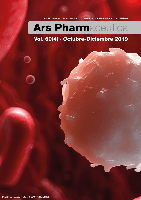
Ars Pharmaceutica
Pioneering research that shapes the future of pharmacy.Ars Pharmaceutica is a distinguished open-access journal published by UNIV GRANADA, EDITORIAL, that has been at the forefront of pharmaceutical sciences since its establishment. With ISSN 0004-2927 and E-ISSN 2340-9894, this journal aims to disseminate high-quality research in pharmacology, toxicology, and pharmaceutics, contributing to the advancement of the field. With a historical scope that spans from 1980 to 2017, it has played a pivotal role in shaping the discourse surrounding pharmaceutical science and its intersection with the arts and humanities. Although currently ranked within the 13th percentile in Scopus for Pharmaceutical Science and the 11th percentile for History and Philosophy of Science, Ars Pharmaceutica continues to uphold its commitment to academic excellence and innovation. By providing a platform for open-access research, it encourages collaboration and knowledge sharing among researchers, professionals, and students, thus enhancing the broader understanding of pharmaceutical developments and their societal implications.

Iranian Journal of Pharmaceutical Research
Fostering a vibrant community of pharmaceutical researchers.Welcome to the Iranian Journal of Pharmaceutical Research, a pioneering publication in the field of pharmacology, toxicology, and pharmaceutics, published by BRIEFLAND. Established in 2002, this journal has been a crucial platform for disseminating innovative research and scholarly articles, contributing significantly to the advancement of pharmaceutical sciences in Iran and beyond. With an impressive trajectory leading towards a convergence of knowledge by 2024, it proudly holds a Q3 ranking in Pharmacology (Medical) and a Q2 ranking in the broader realm of Pharmacology, Toxicology, and Pharmaceutics for 2023. The journal's influence is underscored by its Scopus rank of #25/80 in General Pharmacology, Toxicology, and Pharmaceutics, placing it within the 69th percentile, therefore appealing to researchers, professionals, and students alike. Although the journal operates under a non-open access model, it remains dedicated to providing high-quality research articles that explore the latest advancements in pharmaceutical sciences, making it an essential resource for anyone involved in this vibrant field of study.

ACTA PHARMACEUTICA
Advancing pharmaceutical innovation for a healthier tomorrow.ACTA PHARMACEUTICA is a distinguished open-access journal published by SCIENDO, dedicated to advancing knowledge in the fields of medicine and pharmaceutical sciences. Established in 1992, the journal has made significant contributions to the scholarly community, providing a platform for innovative research and discussion. With a strong presence in both Q2 and Q3 quartiles across various categories including Pharmaceutical Science and Pharmacology, ACTA PHARMACEUTICA ranks favorably, positioning its contributions in the upper tiers of the field. The journal's commitment to open access since 2007 ensures that both practitioners and scholars have immediate access to cutting-edge developments, thereby fostering collaboration and knowledge sharing. With its scope spanning a broad spectrum of pharmaceutical and biomedical research, ACTA PHARMACEUTICA is an essential resource for researchers, professionals, and students keen to stay abreast of the latest advancements and trends in these vital areas of study.

Pharmaceutical Sciences
Advancing pharmaceutical knowledge for a healthier future.Pharmaceutical Sciences, an esteemed journal published by Tabriz University of Medical Sciences, Faculty of Pharmacy, serves as a crucial platform for the dissemination of pioneering research in the fields of pharmaceutical science, pharmacology, and toxicology. With an impact factor reflective of its substantial contribution to the scientific community, this open access journal has been accessible since 2012, ensuring that researchers, professionals, and students worldwide can engage with its rich content. Located in Iran, it has continually evolved, covering research from 2009 to 2024, and boasts impressive rankings in multiple Scopus categories, including Q3 in Pharmaceutical Science and Q2 in Pharmacology, Toxicology and Pharmaceutics. By bridging gaps between scientific inquiry and practical applications, Pharmaceutical Sciences is dedicated to advancing pharmaceutical knowledge and promoting innovative practices that address significant health challenges.

Istanbul Journal of Pharmacy
Advancing pharmaceutical knowledge for a healthier tomorrow.Istanbul Journal of Pharmacy, published by Istanbul University, Faculty of Pharmacy, is a pivotal platform dedicated to the advancement of pharmaceutical sciences and technology. This journal serves as a vital resource for researchers, professionals, and students alike, seeking to disseminate cutting-edge research, reviews, and innovative methodologies within the pharmaceutical discipline. With a commitment to open access, the journal aims to foster a collaborative environment that promotes information sharing and scholarly discourse. The Istanbul Journal of Pharmacy invites submissions that delve into diverse topics ranging from drug formulation to pharmacokinetics, ensuring that readers are equipped with the latest insights and discoveries in the field. This journal is positioned to enhance scientific communication within the pharmaceutical community and support the continuous evolution of pharmacy practice and education globally.
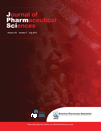
JOURNAL OF PHARMACEUTICAL SCIENCES
Elevating research standards in the realm of pharmaceutics.The JOURNAL OF PHARMACEUTICAL SCIENCES, published by ELSEVIER SCIENCE INC, stands as a cornerstone in the field of pharmaceutical sciences, offering a platform for innovative research and advancements since its inception in 1961. With an impressive Scopus Rank of #36 out of 183 in the Pharmaceutical Science category, this journal is recognized for its commitment to disseminating high-quality, peer-reviewed studies that significantly contribute to the realms of pharmacology, toxicology, and pharmaceutics. Holding a 2023 Q2 category quartile, it attracts a diverse readership encompassing researchers, industry professionals, and students eager to advance their understanding and expertise. While the journal is not open access, it ensures valuable insights in every issue, making it an essential resource for those dedicated to the evolving landscape of pharmaceutical research. With an impact factor that reflects its relevance and influence, the JOURNAL OF PHARMACEUTICAL SCIENCES continues to shape the discourse in its domain, fostering innovation and collaboration among scholars worldwide.
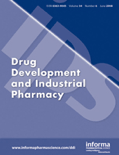
DRUG DEVELOPMENT AND INDUSTRIAL PHARMACY
Pioneering Research in Industrial PharmacyDrug Development and Industrial Pharmacy is a prestigious journal published by Taylor & Francis Ltd, focusing on the critical field of pharmaceutical sciences. With an ISSN of 0363-9045 and an E-ISSN of 1520-5762, the journal has been an essential resource for researchers and professionals since its inception in 1974. It occupies a crucial niche within Drug Discovery, Organic Chemistry, and Pharmaceutical Science, currently ranked in the second and third quartiles, reflecting its solid contribution to the field. The journal encompasses a wide array of topics, including drug development processes, formulation, and industrial manufacturing alongside cutting-edge research in pharmacology and toxicology. With a commendable Scopus ranking demonstrating high relevance—ranked #44 in Pharmaceutical Science—it serves as a vital forum for academia and industry to share innovative findings and methodologies. While it does not offer open access, the journal remains an invaluable resource for those seeking to advance their knowledge and enhance their research in pharmaceutical development.

International Journal of Pharmaceutical Investigation
Enhancing Global Health Through Rigorous InvestigationInternational Journal of Pharmaceutical Investigation, published by INPHARM ASSOC, PHCOG NET, is a premier platform dedicated to advancing the field of pharmaceutical sciences. With the ISSN 2230-973X and E-ISSN 2230-9713, this journal serves as a vital resource for researchers, professionals, and students focused on drug development, formulation, and efficacy. By fostering a rich discourse on innovative pharmaceutical practices and research breakthroughs, the journal plays a critical role in enhancing global health outcomes through groundbreaking scholarly work. The absence of open access allows for selective dissemination of high-quality content, promoting rigorous peer-review processes that uphold academic integrity. Featuring articles that span a diverse range of topics within pharmaceutical sciences, the International Journal of Pharmaceutical Investigation is committed to supporting the ongoing evolution of this dynamic field, making it an essential read for anyone engaged in pharmaceutical research and development.

ACTA POLONIAE PHARMACEUTICA
Pioneering Research in Pharmaceutical TechnologyACTA POLONIAE PHARMACEUTICA is a well-established peer-reviewed journal published by Polskie Towarzystwo Farmaceutyczne, dedicated to the field of pharmaceutical sciences and pharmacology. With a rich history dating back to 1951, this journal serves as a vital platform for disseminating cutting-edge research and developments in pharmaceutical technology, drug development, and therapeutic therapies. Although it currently operates under a subscription model, its commitment to scientific rigor has earned it a respectable impact factor, placing it in the Q3 and Q4 quartiles respectively for Pharmaceutical Science and Pharmacology as of 2023. Researchers and practitioners alike will find value in its comprehensive coverage of essential topics, as well as its diverse range of contributions from both established and emerging scholars in the field. With its address located in the heart of Warsaw, Poland, ACTA POLONIAE PHARMACEUTICA aims to further bridge the gap between academia and industry, paving the way for innovation in drug discovery and therapeutic applications.
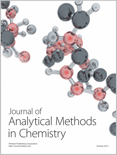
Journal of Analytical Methods in Chemistry
Fostering collaboration in the vibrant world of analytical science.The Journal of Analytical Methods in Chemistry, published by HINDAWI LTD, stands as a premier platform dedicated to the dissemination of research in the vibrant field of analytical chemistry. With an ISSN of 2090-8865 and an E-ISSN of 2090-8873, this Open Access journal has been committed to providing unrestricted access to quality research since 1978, thereby fostering greater collaboration and innovation among researchers, professionals, and students globally. The journal showcases rigorous research insights spanning diverse categories, earning impressive Scopus rankings including Q2 in Chemical Engineering and Q3 in Analytical Chemistry for 2023, positioning itself effectively among respected peers. Its interdisciplinary approach also covers significant contributions in the realms of instrumentation and computer science applications, thus addressing contemporary challenges and advancements in analytical methodologies. By bridging theoretical underpinnings with practical applications, the Journal of Analytical Methods in Chemistry aims to catalyze knowledge exchange while enhancing the global discourse in analytical science.